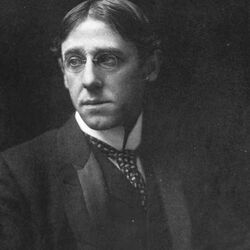JANE ADDAMS DENIES SLUR ON THE SOLDIERS
Repudiates the Marshall Story That She Used Word 'Murderer.'
In the course of his testimony given in a deposition presented in the Ford-TRIBUNE trial last summer, Edward Marshall, an American journalist of London, was questioned regarding an interview with Henry Ford, printed in the Detroit Free Press of April 11, 1915. In that interview Mr. Marshall quoted Mr. Ford as saying:
"To my mind, the word 'murderer' should be embroidered in red letters across the breast of every soldier." With reference to this statement, the following questions were put to Mr. Marshall and he made the following answers:
Q. -- Will you tell us, Mr. Marshall, just what discussion you had with Mr. Ford personally regarding this first part of the article where it says, "He looked out of the window, saying, 'To my mind the word murderer should be embroidered in red letters across the breast of every soldier'"? A. -- I believe that that statement is in a sense an inaccuracy, although not in the journalistic sense an inaccuracy.
Jane Addams Quoted.
Q. -- Tell us what discussion you had with Mr. Ford. A. -- I believe that that statement was made to me by Miss Jane Addams when I went to see her in company with Norman Hapgood.
Q. -- That does not answer my question. A.-- and that the thing clung in my mind, and that after going to Detroit I mentioned this to Mr. Ford and he agreed with it, that he consented to its use. It originated with Miss Jane Addams.
When Mr. Ford was on the witness stand at Mount Clemens, the following questions were put to him:
Q. -- I just want to understand what you mean. You have twenty-one times in this little book that I called your attention to referred to murderers and murderous, all relating to preparedness; is that where you said in the Marshall article that the word "murderer" should be embroidered upon the uniform of every soldier? A. -- In the Marshall article, I think Marshall said that was a quotation from Jane Addams.
Ford Admits Publication.
Q. -- I don't care if it is a quotation. You published it, Mr. Ford. A. -- Yes, I admit it.
Q. -- You published the statement. Jane Addams did not publish it to the world, did she, that you ever know of? A.- She may have done it.
Q. -- Did you ever know of her doing it? A. -- No.
Q. -- Did you ever hear of her doing so? A. -- No.
Q. -- You said you adopted the words that I have stated? A. -- Yes.
Q. -- That every soldier and every sailor should have embroidered on his breast, on their uniforms, the word "murderer"? A. -- A professional soldier.
Miss Addams was not drawn into the case further than this, nor were the statements of Marshall and Ford placing upon her the first use of the "murderer" sentiment followed up by either party to the suit.
THE TRIBUNE has just received from Miss Addams a letter which specifically denies that she ever in her life used such a statement. This repudiates Mr. Marshall's statement flatly -- a statement which THE TRIBUNE understands was given in an effort to protect Mr. Ford and throw the onus upon Miss Addams.
The letter Miss Addams has sent to THE TRIBUNE is a copy of one she wrote on Oct. 20 to a Mr. Van Allen, Boston clergyman who had asked her whether she had used the phrase about "murderer embroidered upon the breast of every soldier." Miss Addams said to Mr. Van Allen:
"You will doubtless recall that the statement was made in the Ford trial by one named Edward Marshall, who had repeated it to Mr. Ford. When asked for his authority Mr. Marshall, who is a newspaper man, said that I had made the statement in an interview granted to him in the presence of Norman Hapgood.
Saw Marshall Only Once.
"I never saw Mr. Marshall but once, when I gave him an interview in New York. At the time he made the statement I was abroad. Norman Hapgood, who is, as you know, minister of Denmark, was, of course, also abroad and there was nothing left except Mr. Marshall's unsupported statement. The attorney promptly challenged Mr. Marshall's words and in an interview later he said that I had made the statement only in regard to German soldiers. He thus carefully qualified the statement for his own protection.
"The whole incident was so obviously an attempt to catch Mr. Ford that it did not occur to me that it would be taken seriously. I have spoken in public and written my views so constantly that it is strange my opinion should have to be set forth by a newspaper man who had seen me but once and was totally unable to corroborate the statement he made.
"Since, however, Miss Hamilton has written me that you did take the statement seriously may I hasten to assure you quite categorically that I have never used those words nor said anthing that could even remotely be so construed. May I quote from page 235 of my book, 'Newer [Ideals] of Peace,' published by MacMillan and Co. in 1907. It is the only reference I can find anywhere in my writings as to the motive of the soldier:
"'We may at last comprehend the truth of that which Ruskin has stated so many times, that we worship the soldier, not because he goes forth to slay, but to be slain.'
"I shall be very glad to send a copy of this statement to the Boston Transcript or the Springfield Republican, two of the very few papers that printed the statement. Even the Chicago papers dismissed it as flimsy evidence."

















Comments